Login to
Please Verify Your Phone or Email
We have sent an OTP to your contact. Please enter it below to verify.
Available 24/7 to assist your customers
I effortlessly manage customer queries, automate workflows, and elevate your business efficiency with Kong's AI-powered chatbot—simple, smart, and tailored just for you!
Build Your Custom Chatbot in Simple Steps
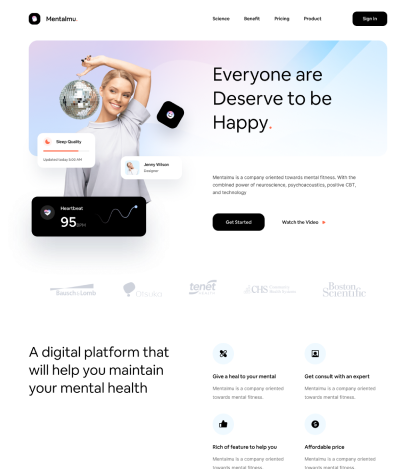
Website Scraping: Extract essential data from your website to empower chatbot intelligence and improve response effectiveness.
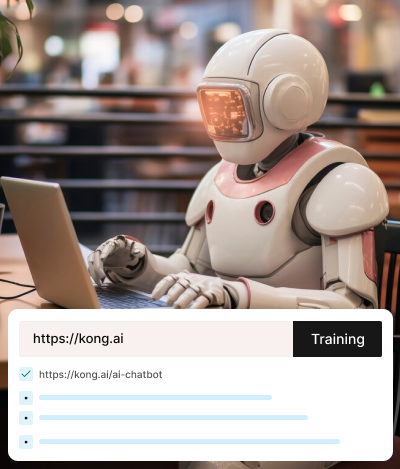
Self-Training AI: Our advanced AI automatically learns from data, refining understanding for accurate, contextual user responses.
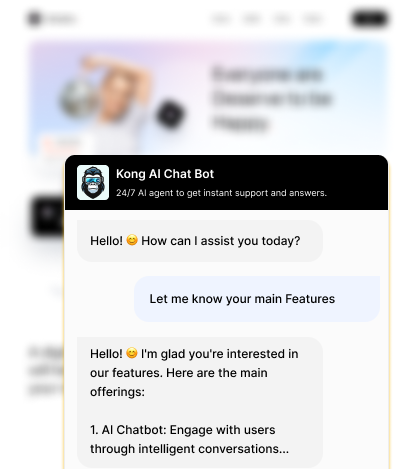
Experience Your Bot in Action with Live Preview: Interact with your chatbot on your website pre-launch, fine-tuning responses for a seamless user experience.
24/7 instant support, guiding visitors through services and improving user experience with timely assistance.
Responses based on user preferences, creating seamless, engaging, and human-like conversations and enhancing user satisfaction.
Send timely updates on new features and services, keeping users informed and boosting engagement. features or upgrades.
Kong.ai’s foundational capabilities provide robust AI-driven interaction solutions, enabling businesses to automate customer service, sales, or marketing efforts across multiple communication channels
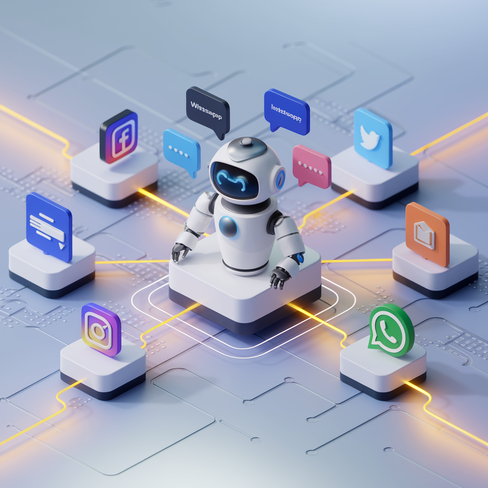
This feature enables a human-like, 24/7 chatbot that engages users in real-time, answering questions, resolving issues, and guiding visitors through services or products, enhancing user experience..
Specialized AI agents are designed to handle specific tasks, such as customer support, marketing, or sales. Each agent is trained with focused knowledge to maximize efficiency and deliver domain-specific assistance.
The AI chatbot can interact with users across various platforms like websites, mobile apps, social media, and messaging services, ensuring a seamless and consistent customer experience across all channels.
Kong.ai provides flexibility in integrating and customizing the chatbot according to your business needs. With support for multiple language models and no-code solutions, Kong.ai ensures that businesses can easily deploy AI without technical barriers.

Modify the chatbot’s appearance, tone, and behavior to align with your brand identity and business requirements. From the chatbot’s visuals to conversational flows, everything can be tailored to meet customer needs.
The platform supports multiple Large Language Models (LLMs), giving businesses the ability to choose the model that best suits their domain-specific needs. This ensures that the chatbot can handle various language processing tasks with optimal accuracy and efficiency.
Kong.ai offers easy-to-integrate AI tools without the need for coding expertise. This feature allows businesses to rapidly implement and customize AI-driven solutions into their workflows, reducing the time and effort required for deployment.
These features are geared towards improving the chatbot’s understanding and capabilities. By training the chatbot on specific datasets and using pre-built templates, businesses can ensure that the AI delivers precise and relevant responses.
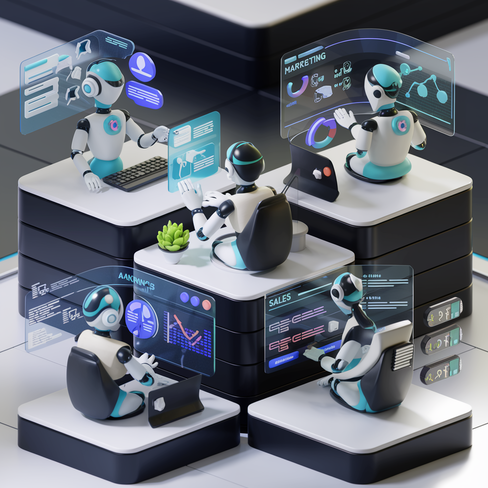
Kong.ai ensures that businesses can securely scale their AI solutions while maintaining high performance. The platform is designed to handle growing customer bases without compromising speed or security
This feature routes AI responses through internal systems before they reach the customer, ensuring that all communications comply with business policies and data security standards. It helps businesses maintain control over AI-generated outputs.
Kong.ai is built to scale as your business grows. Whether you are handling hundreds or millions of customer interactions, the platform maintains performance and responsiveness, ensuring seamless service at all levels.
At its core, AI chatbots or AI agents refer to technologies that enable machines to engage in conversations that mimic how we humans naturally communicate. By combining powerful components like Natural Language Processing (NLP), Machine Learning (ML), and voice recognition systems, an AI assistant provides a communication experience that feels personal, responsive, and often uncannily accurate.
Whether you're interacting with a chatbot to check your bank balance, asking a virtual assistant to schedule a meeting, or getting customer support from an AI-driven system, conversational AI chatbots adapt to the nuances of language, intent, and even emotional tone. It’s not just about understanding words—it’s about getting to the heart of what people mean, anticipating their needs, and responding in ways that feel natural. So instead of awkward robotic responses, we’re talking more fluid, intuitive conversations, making it feel like the technology gets you.
AI-powered conversations might seem like magic, but behind the scenes, it’s a sophisticated blend of technologies that work together to understand and respond to human language. From deciphering what users are really saying to improving over time, conversation-driven AI systems are designed to make interactions feel as natural and intuitive as possible. But how does it actually pull this off? It’s all about leveraging advanced tech like Natural Language Processing (NLP), Machine Learning (ML), Large Language Models (LLMs) and Automatic Speech Recognition (ASR).
Let’s break down the science behind magic.

NLP is like the wise old sage in a fantasy novel—it's the backbone of AI assistants. It allows machines to process and understand human language beyond the surface, digging into the meat of what we’re trying to say (or yell, as is common during family game night). This involves analyzing the structure, meaning, and context of words in user queries. Ever tried explaining your day to a robot? Yeah, it’s a lot more complex than it seems.
Thanks to advancements in NLP, our conversational partners now grasp even the most enigmatic sentences we throw at them and can respond in ways that feel, well, natural. Mind-blowing, right?
Picture this: a dog learning tricks—except it’s not a dog, and, well, it doesn’t have fur. It’s machine learning algorithms! These beauties help AI chatbots improve over time. They learn from the past, altering their responses based on accumulated data. So, every time you engage with a chatbot, it’s like giving it a little nudge to be better. This process not only sharpens its responses but also personalizes user experiences—meaning next time, it might just remember you like your coffee black and bitter, much like my sense of humor.
This learning adaptation leads to an AI assistant that gets smarter with each interaction, ultimately resulting in a more personalized service for users.
Let’s talk about large language models—sounds grand, right? These are the superstars of NLP, trained on massive datasets to master the nuances of human language. They essentially gulp down gigabytes of text and spit out responses that are not just appropriate but incredibly engaging. Imagine a conversation so fluid it feels like you're chatting with an old friend instead of a code-based entity.
With LLMs, AI assistants can handle in-depth discussions, answer complex questions, and mimic those delightful human conversational patterns—sarcasm included!
Ever tried employing ASR and ended up feeling like you're talking to a brick wall? Well, it certainly has its hiccups, but this tech is crucial for AI bots to understand spoken language. It translates your voice inputs into text, allowing that slick interaction between humans and machines.
ASR shines particularly in scenarios where hands-free interaction is key, like you inevitably trying to place a call while at the gym (hey, it’s tough multitasking while lifting, right?).
AI bots are like the everyday heroes of conversational AI—showing up everywhere, from social messaging apps to websites. They engage users in a chat format, eager to assist and answer queries. ‘Hello, chatbot. Can you book me a pizza?’—Yes, please!
Modern chatbots can handle myriad tasks, from basic inquiries to complex transactions, thereby significantly elevating user engagement rates.
You know, all those smart devices that obey your every command (well, almost)? That’s our trusty interactive voice assistants for you. They use voice recognition to perform tasks—we’re talking about playing your favorite podcast while reminding you of your next meeting. They’re basically the helpful friends we all wish we had. (Except they won’t judge you for wearing that old t-shirt again.)
These assistants excel in providing a hands-free option to manage tasks and access information.
Interactive Voice Response systems, or IVR, now that’s a mouthful! They’re often deployed in customer service scenarios, guiding users through voice commands to navigate complex menus. Think of it as having a phone assistant who doesn't take lunch breaks.
This tech helps businesses tackle high call volumes efficiently while delivering valuable information to customers in a streamlined fashion.

Are you feeling left out in the age of instant gratification? Worry not! Businesses leveraging AI conversation chatbots can boost customer satisfaction like nobody's business. A recent study found that chatbots can resolve up to 70% of queries on their own, making them a powerful tool for streamlining interactions—so, a well-equipped chatbot simplifies the experience for both you and your customers. Plus, another survey showed that 74% of customers favor chatbots over human agents when it comes to resolving their inquiries.
It's all about giving folks what they want—fast, friendly, accurate responses.
Better customer service leads to enhanced loyalty and retention—so everyone wins!
Imagine a world where your team spends less time on mundane tasks. Well, it’s happening! AI chatbots can automate those repetitive tasks we all dread. A McKinsey report shows that businesses implementing AI solutions can see a productivity boost of up to 40%.
This newfound efficiency frees your employees to focus on high-value tasks, ultimately helping drive growth.
Who doesn’t love a personal touch? McKinsey’s research reveals that 71% of consumers expect companies to provide personalized interactions, while 76% become frustrated when this expectation is not met. With conversational AI, businesses can adjust interactions based on individual user preferences. It’s like your favorite barista remembering exactly how you take your coffee every time, but on a grander scale!
According to another McKinsey report, personalization can boost marketing ROI by five to eight times and increase sales by 10% or more.
Money matters, especially in business! Implementing AI chatbot solutions can reduce operational costs drastically. Automation in customer service reduces the need for extensive staffing while maintaining stellar service quality.
For instance, according to Juniper Research, by the end of 2023, chatbots are expected to save businesses up to 2.5 billion hours of work. This prediction was made before the launch of ChatGPT that made AI assistants finally “human” as well as significantly more accessible to all business sizes.
AI bots aren't just about conversations; it also collects vital data on user interactions. This information is treasure for businesses, providing insights into preferences and trends.
This data enables agile responses to market needs, all while informing future marketing strategies and product development.
AI conversations are not just a trend—it’s becoming a strategic asset in various business functions, helping companies drive efficiency, engage customers, and optimize operations. Whether it’s marketing, sales, customer support, or even human resources, AI assistant are stepping up to handle the heavy lifting, leaving teams to focus on what they do best. Let’s break down how it’s making an impact across key business areas.
AI chatbots can play a leading role in marketing by delivering personalized content, nurturing leads, and creating seamless customer journeys from start to finish. Imagine a bot that not only engages potential customers but also tailors its message to each person’s preferences and behaviors, leading to better engagement and higher conversion rates.
Having an AI Marketing Agent. It’s like having a marketing superhero on your team—no cape needed, but hey, if you want to wear one, go for it! With conversational AI, your campaigns can work around the clock, constantly adapting and improving based on customer interactions.
In sales, AI Sales Assistant is a game-changer when it comes to automating the tedious but necessary parts of the process, like lead generation and qualification. Instead of your sales team wasting time chasing down cold leads, AI can do the heavy lifting—filtering, qualifying, and passing on the most promising opportunities to your team.
Let the machines do the grunt work, freeing up your salespeople to focus on what they’re great at: closing deals and building relationships. With AI chatbots managing the pipeline, sales teams can become more efficient and effective, especially if it integrates with tools your team already uses like SalesForce.
AI chatbot technology is transforming customer support by providing instant, 24/7 assistance to customers. Whether it’s troubleshooting issues, answering frequently asked questions, or guiding users through self-service options, AI is on-call to deliver quick resolutions. And it doesn’t just handle simple tasks—it can escalate more complex issues to human agents seamlessly.
No more waiting until business hours for a reply or watching the minutes tick by while stuck on hold. Now, frustrated customers can get support at 3 A.M. without having to refresh their inbox for an email response. The result? Higher customer satisfaction and a much lighter workload for your support team.
AI assistants can streamline human resources by automating tasks like answering employee queries, scheduling interviews, and onboarding new hires. It can be used to provide immediate answers about company policies, benefits, or payroll—essentially acting as an always-available HR assistant. An AI Recruitment Agent can help filter through resumes and even engage candidates in initial conversations, speeding up the hiring process.
Imagine an HR team that never has to pause to answer the same policy question for the hundredth time or manually schedule back-to-back interviews. With conversational AI, HR teams can focus more on people and less on paperwork, improving both employee and candidate experiences.
Wondering if language-driven AI could make a difference in your industry? You’re not alone. This technology has the potential to automate routine tasks, elevate customer experiences, and drive efficiency. Let’s explore how it could benefit your sector—and why it might be worth considering!

In education, AI chatbots could serve as an always-available tutor, providing students with instant feedback, answers to questions, and personalized learning assistance. Imagine a scenario where a student is stuck on the Pythagorean theorem late at night. Instead of waiting until the next day, they ask a bot and receive a clear, easy-to-understand response.
For instance, our AI Education agent is like having a personal assistant on steroids. It manages everything from course selection and exam schedules to attendance tracking and grading. Plus, it serves up personalized learning recommendations to make the student experience smoother and more enjoyable. It’s your academic sidekick, always ready to help.
If only our high school math teachers were as responsive! This type of AI could support both students and educators by offering more accessible, round-the-clock learning opportunities.
In eCommerce, AI chatbots have the capacity to transform customer interactions. These assistants could guide shoppers through their buying journey, answer product questions in real time, and even suggest personalized recommendations based on their preferences. This technology doesn’t just assist—it can boost sales through intelligent upselling and cross-selling strategies, offering customers a more seamless shopping experience.
It’s like having a personal shopper who knows exactly what you’re looking for, always ready to help.
In healthcare, AI chatbots have the potential to streamline patient management by handling appointment scheduling, answering routine medical queries, and delivering test results. The tech could free up healthcare professionals to focus more on patient care, while patients benefit from faster, more efficient service. Picture a virtual assistant booking your appointments, reminding you about medications, or answering simple health-related questions.
For example, one of Kong.ai top solutions is a healthcare assistant that assists patients with diagnoses and consultations, providing quick as well as reliable support:
It’s like having a personal assistant who never clocks out or needs a coffee break.
AI implementation could revolutionize the hospitality industry by enhancing guest services and personalizing experiences. From contactless check-ins to providing 24/7 support for room service or local recommendations, this technology has the potential to make every guest’s stay more enjoyable. Imagine walking into a hotel where a chatbot has already handled your check-in, and you can request extra towels or a dinner reservation through a quick message.
For example, our tailored AI Appointment Agent takes care of just that—automated check-ins and reservations, 24/7 concierge, personalized upsells, you name it!
No more long waits at the front desk—just instant, efficient service.
In the finance sector, AI could simplify everything from routine transactions to complex financial advice. Imagine managing your budget, transferring funds, or even getting personalized investment suggestions—all through a simple voice command or chat interaction. It can make financial management more accessible, allowing users to get immediate answers without the jargon or long wait times.
Think of it as having a financial advisor in your pocket, minus the hefty consultation fees. Finance at your fingertips could be closer than you think!
All in all, conversation-driven AI solutions are very flexible and ready to be implemented into any industry where communication is key.
Implementing an AI chatbot strategy isn’t just about hopping on the latest tech trend; it’s about understanding where AI can make the biggest impact and ensuring it aligns with your business goals. If done right, it can enhance customer experience, improve efficiency, and reduce operational headaches. Here's how to get started:
Before diving into the world of AI, take a moment to analyze your organization’s core pain points. Is customer support overwhelmed with repetitive inquiries? Are sales teams spending too much time qualifying leads instead of closing deals? Identifying these friction points will help you target areas where AI chatbot solutions can drive meaningful improvements.
It’s all about starting at the heart of the matter. Think of it as asking, "Where can AI pack the most punch?" Once you pinpoint those opportunities, you’re on the path to a smart implementation.
Next, take a hard look at your budget and available resources. Implementing AI bots can be a game-changer, but it requires the right investment to make an impact. Consider the costs for the technology, platform, integrations, and any training or support your team may need. Can your current infrastructure support AI? Do you have the staff to maintain it, or will you need to outsource some expertise?
Being realistic about what you can afford today (and what you'll need tomorrow) is key. Remember, it’s not just about spending money; it’s about getting value for every dollar you invest.
Who will be interacting with your conversational AI? Identifying your audience is crucial because the design of your AI system should be tailored to their needs. Are you building this for customers looking for quick service, internal teams needing HR support, or prospective clients inquiring about your products? Different audiences will have different expectations, and the tone, functionality, and complexity of the AI should reflect that.
Understanding who you're building this for will guide everything from tone and language to the features your AI should prioritize.
Selecting the right AI chatbots platform or agent can make or break your strategy. Look for a platform that fits your needs today but can also grow with you as your business scales. Key things to consider include user-friendliness (you want your team to actually enjoy using it), integration capabilities (it should play nicely with your existing tech stack), and scalability (because your AI should grow as your business does).
Think of it like buying a well-tailored suit: it should feel comfortable, look sharp, and be flexible enough to handle whatever the day—or the future—throws at you. A platform that checks these boxes will set you up for long-term success.
By following these steps, you’ll be well on your way to an AI chatbots strategy that’s not only aligned with your business goals but also poised to deliver tangible results. From pinpointing your pain points to choosing the right platform, a thoughtful approach ensures your AI investment truly pays off.
To make sure your AI chatbots don’t just work but work well, it’s essential to follow a few best practices. These will help you create a system that not only meets user expectations but exceeds them, offering smooth, effective, and even delightful interactions.

An AI-powered bot is not a "set it and forget it" solution. Just like people, your AI needs to evolve continuously. Regularly update and refine the system based on user interactions and feedback. This ensures it stays relevant, accurate, and capable of meeting the changing demands of your audience.
It’s a bit like personal growth—only for AI. The more it learns, the better it gets (and hopefully without the growing pains!).
At the end of the day, your AI chatbot is only as good as the experience it delivers. Prioritizing user experience is non-negotiable. Make sure the interface is intuitive, interactions are seamless, and responses are accurate. When users feel like they’re dealing with a clunky or frustrating system, acceptance rates plummet, and no one enjoys that.
A smooth, effortless experience is what wins people over—because let’s face it, nobody has time for a bot that can't get it right the first time!
Expand horizons with our 50+ integrations, seamlessly connecting your tools for ultimate efficiency.














Beyond LinkedIn outreach, Kong.ai empowers you to post jobs, fetch leads, send emails through Gmail, and WhatsApp messages — all through conversational agents. The automation runs in the background, rate-limited, and non-intrusive, allowing you to effortlessly manage tasks across multiple platforms.

Kong.ai's smart text and voice bots answer customer questions 24/7 on your Website, Whatsapp, Facebook and Email.

SDR agent assists with sales development tasks such as generating leads, verifying emails, and finding LinkedIn profiles.

Marketing agent lets you create content, work social media, do SEO link building, send hyper personalized campaigns and even build your website.

This agent assists with HR recruitment tasks such as posting jobs and shortlisting candidates.

Hey there! I’m your SalesForce Agent, Here to streamline your sales process by managing contacts, organizing leads.
Kong.ai allows your business operations to be operated starting from conversational fully-ai bots to advanced agents (virtual employees).
Join the webinar to discover how Kong.ai's AI solutions help automate and scale Customer Support, Sales, HR, and Marketing like the Fortune 500.
Discover how leading companies leverage Kong.AI to automate customer interactions and drive engagement.

Kong.AI’s intelligent bots have revolutionized our customer service, automating interactions and providing real-time assistance, enhancing customer satisfaction significantly.
RONALD KLUGER
CEO at KPSYNCLABImplementing Kong.AI was a game-changer for us. The ease of integration and the ability to customize interactions based on our needs allowed us to provide personalized experiences at scale.
CHRISTIAN BJERRE NIELSEN
CPO at uQualioWith Kong.AI, we’ve seen a 40% reduction in support costs while maintaining high customer satisfaction rates. Their AI bots handle queries with human-like precision.
KIM LY
Operations ManagerWe chose Kong.AI for its unmatched customization capabilities and robust analytics, enabling us to tailor our services to the unique needs of our diverse clientele.
UE
SMALL-BUSINESS USER
Kong.AI has transformed our onboarding process, providing a seamless and interactive experience for our customers, while enhancing our operational efficiency.
TEJAS
MID-MARKET CONSULTANTThe powerful AI tools from Kong.AI have enabled us to proactively engage with our customers, reducing churn and increasing retention rates.
Emma Wilson
COSMETICS MARKETING ADMINISTRATORIntegrating Kong.AI into our ecosystem was straightforward, and it has significantly improved our customer engagement metrics across all channels.
STONE GYE
Owner at Stonegye.digitalAutomate Your Business Like the Fortune 500 with Kong.ai's Super Agents and Conversational Bots